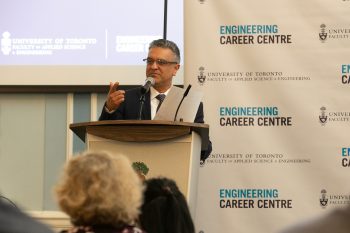The University of Toronto is hoping to cash in on the growing demand for micro-space technology by selling more of the small satellites it makes at its flight laboratory. The mini-satellites – the size of a suitcase or even smaller – have already been sold to countries such as Norway, Australia and Poland. They start at $600,000 and can fetch more than $3-million.
Project manager Grant Bonin (MASc candidate, UTIAS) says the lab at the University of Toronto Institute for Aerospace Studies is building more small satellites than any other organization in Canada. “They’re cheaper and faster than big spacecraft,” Mr. Bonin told about 70 delegates at the annual conference of the Canadian Space Commerce Association He said more business opportunities lie ahead.
“We have about a dozen spacecraft in various stages of development,” he said in a later interview. “These are very miniaturized spacecraft whose purposes are everywhere from astronomy to telecommunications to ship tracking.” Mr. Bonin pointed out that the Canadian Space Agency has limited funds and can do only so much. The agency is currently awaiting government approval of its long-term space plan, but that is expected to be further delayed if a federal election is called.
Josh Dore, the agency’s technology development manager, said the 10-year space plan is “stuck in Ottawa” but added he’s optimistic it will see the light of day.
He told the conference the big word at the agency is “sovereignty” – which translates into keeping an eye on the Canadian North.
Arctic sovereignty was also the main topic of discussion during a video conference with Major Marc Fricker, a lecturer at Royal Military College in Kingston.
“We’re claiming that all of this acreage is ours, and yet we’d be very hard-pressed to survey it, let alone protect it,” he said.
Read the full article at The Globe and Mail.



